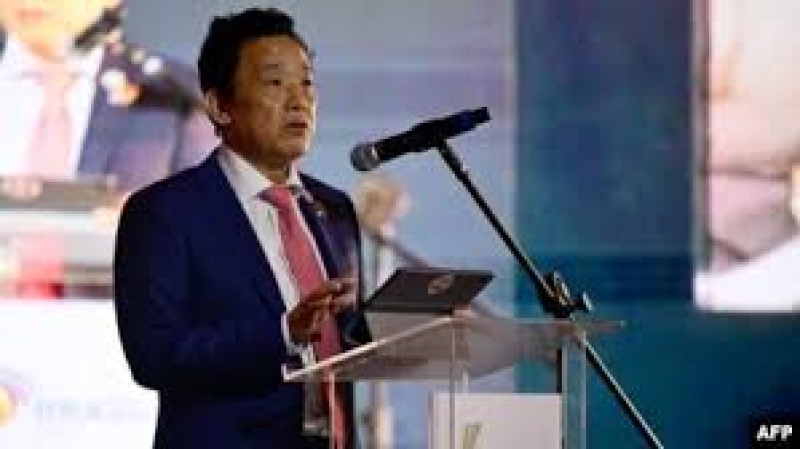- Israel Strikes Tehran with US Support Amid Nuclear Tensions |
- India Sees 9% Drop in Foreign Tourists as Bangladesh Visits Plunge |
- Dhaka Urges Restraint in Pakistan-Afghan War |
- Guterres Urges Action on Safe Migration Pact |
- OpenAI Raises $110B in Amazon-Led Funding |
FAO head’s rare visit to North Korea raises questions

A rare visit by the head of the Food and Agricultural Organization to North Korea has drawn criticism from former U.S. officials and humanitarian experts, with some raising the possibility of the U.N. official, a former Chinese official, using his position to serve China’s political interests.
FAO Director-General Qu Dongyu, currently in his second term and who formerly served as China’s vice minister of agriculture and rural affairs, took a rare trip to Pyongyang, July 13-16, and praised North Korean leader Kim Jong Un for making “great achievement” in food security and agricultural development, according to a FAO statement.
Qu’s trip was the first by an aid organization since the outbreak of the COVID-19 pandemic in 2019.
For several decades, North Korea has suffered chronic food shortages exacerbated by recurring famine and floods damaging harvests. A FAO report released in July described North Korea’s food situation as “fragile.”
Hit again by heavy rains that flooded vast farmlands in Sinuiju and Uiju near the Chinese border, Kim “expressed deep concern” at an emergency meeting held to restore the damage after inspecting flood-hit areas, said state-run KCNA on Wednesday, reports VOA.
“The fact that North Korea has suffered periodic famines and for the head of the FAO to praise” the country’s food situation “is beyond ironic,” said Kevin Moley, former U.S. ambassador to the U.S. Mission to the U.N. in Geneva from 2001 to 2006.
“It’s nothing more or less than a political agenda between China and North Korea,” he added.
Other former U.S. officials and analysts said the visit seems to have been made to benefit bilateral interests of Beijing and Pyongyang.
“Qu’s comments were probably an attempt by the DPRK leadership to use the U.N. to tell the world everything is fine” at a time when “we have evidence there was a second famine from 2018 to 2023 that killed tens of thousands or more,” said Andrew Natsios, who served as administrator of the U.S. Agency for International Development from 2001 to 2006.
“The Chinese government is worried of an increase in Russian influence in the DPRK and a decline in [its own] influence. The Russians are providing food to North Korea beginning last year in exchange for the DPRK providing them artillery shells, which the Russians are running out of in the Ukraine war,” added Natsios, the director of the Scowcroft Institute of International Affairs at Texas A&M University.
North Korea’s official name is the Democratic People’s Republic of Korea.
China has long been the primary food aid provider to North Korea, and deepening ties between Moscow and Pyongyang since Russian President Vladimir Putin’s visit to Pyongyang in June is believed to make Beijing nervous about its own influence on North Korea.
VOA contacted the FAO for its comments on the criticism of Qu’s Pyongyang visit but did not receive a reply.
Max-Otto Baumann, a senior researcher at the German Institute of Development and Sustainability, said China might be interested in promoting agricultural productivity in North Korea through the FAO.
He said that could be done “with little transparency and accountability” such as through Qu’s signature Hand-in-Hand Initiative “seen by some FAO insiders and diplomats as a continuation of the Chinese Belt and Road Initiative.”The Hand-in-Hand Initiative is aimed at eradicating poverty and ending hunger and malnutrition through data-driven agricultural transformation.
Courtney Fung, a non-resident fellow at the Lowy Institute, said the Chinese Embassy in Pyongyang “sends an implicit message” that China’s leadership role at the FAO can gain access to North Korea “when other leaders cannot or have not, while advancing ostensibly apolitical technical solutions for global governance problems.”
The Chinese Embassy in Pyongyang was the first to release a statement about Qu’s trip there ahead of the FAO.
Qu has been accused of using the FAO as a vehicle to spread China’s influence in countries the agency serves and to fulfill Beijing’s goals in the several occasions in the past.
On the other hand, Jerome Sauvage, the U.N. resident coordinator in North Korea from 2009 to 2013, said, “No FAO director-general has ever been completely protected from the influence of their country of origin.”
Qu’s “connection with China actually facilitates the reentry of one U.N. agency into DPRK,” he added.
Bradley Babson, a former World Bank adviser and a current advisory council member of the Korea Economic Institute of America, said Qu’s trip does not seem to be motivated by China’s political interest but rather by “trying to help North Korea find a better way to feed its people with U.N. support.”

